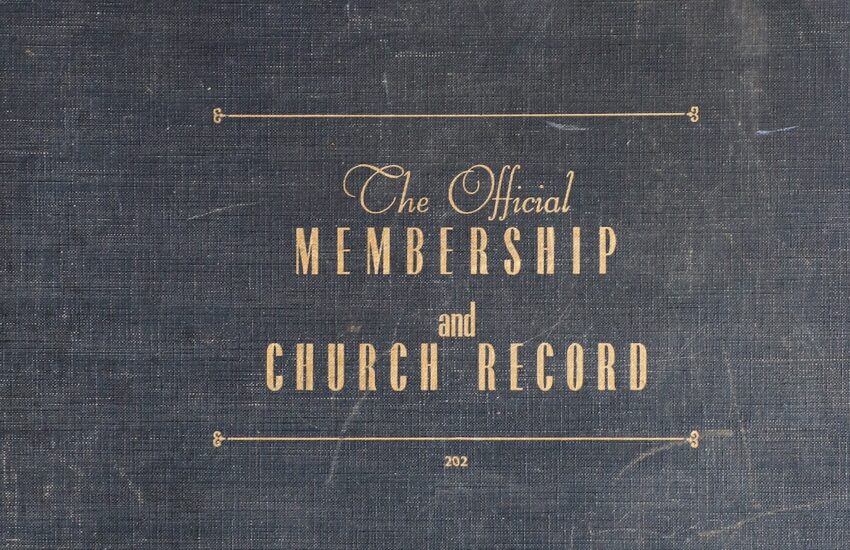The Joy that Submits in the Church
We are told, in the quiet murmurings of our culture and the loud proclamations of its champions, that happiness is a fragile treasure, one that can only thrive when kept far from the weight of obligation. To be truly happy, they say, we must sever every tether to authority, walk unburdened by accountability, and forge a path that answers to no one but ourselves. This is the anthem of our age, a tune both alluring and insidious, promising joy while quietly dismantling the foundations on which joy is built.
In the shadowed halls of this world, this narrative takes on the guise of wisdom. It weaves itself into the fabric of our thoughts, even as Christians. It whispers that submission is not only unnecessary but dangerous—that it is a relic of a bygone, oppressive era. The language of yielding, of bending the knee to authority, is cast in tones of disdain, as though to submit is to abandon one’s dignity and forfeit all chance of happiness.
Yet this narrative is not simply a harmless misunderstanding; it is a seductive falsehood, an idea that gnaws at the very roots of truth. It twists the reality of God’s good design, turning submission, a thing of beauty and freedom, into something ugly and constraining. And so, like travelers led astray by a deceiving guide, we stumble down paths that promise joy but deliver only isolation, confusion, and despair.
At the heart of every road to destruction lies the same question that echoed in Eden: “Did God really say?”
Independence vs Submission?
But let us not be taken in, my friends. The Bible, as it so often does, takes this cultural narrative, turns it inside out, and hangs it up to dry. True joy—the kind that doesn’t waver in the face of calamity—is not found in independence, self-rule, or giving authority the squinty-eyed “who-do-you-think-you-are” look. No, Scripture teaches us that real joy comes through submission. First, to the sovereign God who governs all things with His perfect hand, and then to the earthly authorities He has established for our good. This isn’t a grim, teeth-gritting servitude. It’s a joyful acknowledgement of the divine order—a good gift given for His glory and for our flourishing.
Yet, submission has a PR problem, especially among Christians. We’ve been catechized by a culture drunk on individualism and bruised by the failures of fallen leaders. Submission, particularly to church elders, has become a dirty word—something to be avoided or, at best, grudgingly tolerated. Skepticism toward leadership has become a virtue, and many believers treat submission like it’s an archaic relic left over from the dark ages of Christendom.
But let’s call this what it is—misplaced rebellion dressed up as discernment. Joyful submission to godly leadership is not only biblical, it’s essential. It’s part of God’s blueprint for human flourishing. When we submit to those who are charged with watching over our souls, we’re not surrendering our joy; we’re discovering it. God’s design isn’t a set of arbitrary rules meant to keep us in line—it’s a means of grace, a path that leads straight to the green pastures and still waters of His provision. And if we think otherwise, it’s not because God’s design is flawed; it’s because we are.
The modern world loves a good fairy tale, and one of its favourites is the myth that joy and independence are best friends. From the catchy slogans of fast food joints (“Have it your way”) to the relentless drumbeat of self-help gurus (“Be your own boss”), autonomy is sold as the golden ticket to happiness. Submission, meanwhile, is cast as the villain of the story—something dark and oppressive, a surrender of freedom and, while we’re at it, your dignity too.
So Jesus said to the Jews who had believed him, “If you abide in my word, you are truly my disciples, and you will know the truth, and the truth will set you free.”
John 8:31-32
Notice what He doesn’t say: He doesn’t say freedom is doing whatever you feel like or cutting yourself off from all authority. No, freedom is found in knowing the truth—God’s truth—and living under it.
A Means of Grace
Far from being the enemy of joy, biblical submission is one of God’s means of grace—His way of fostering joy and flourishing among His people. Let’s consider three ways this works:
1. Submission Reflects the Gospel
At the very center of the Christian faith is the ultimate act of submission: Christ’s obedience to the Father’s will. Paul writes in Philippians 2:5-8 that Jesus “humbled Himself by becoming obedient to the point of death, even death on a cross.” His submission wasn’t a reluctant shuffle to the cross, muttering complaints along the way. It was a deliberate, joyful obedience motivated by love for His Father and His people (Hebrews 12:2).
And His submission to the Father in no way diminishes His equality within the Trinitarian community. Far from being a mark of inferiority, Christ’s willing obedience to the Father’s will highlights the beauty of the divine order within the Godhead. The Son’s submission is not born of coercion but flows freely from perfect love and unity. In the mystery of the Trinity, authority and submission coexist without rivalry or loss of dignity. The Father, Son, and Spirit remain co-equal in essence, power, and glory, even as their roles within redemption reveal the harmony of their divine relationship.
When we submit to godly leaders, we echo this Gospel reality. Our submission becomes a living picture of Christ’s Lordship, showing the world what it means to follow Him—not just in theory, but in practice. It’s a way of saying, “Christ is King, and I trust His design for His church.”
2. Submission Promotes Unity
A church that leans into joyful submission is a church that thrives in peace and unity. On the flip side, a church that resists submission can quickly turn into a battlefield of clashing egos and unresolved tensions.
Obey your leaders and submit to them, for they are keeping watch over your souls, as those who will have to give an account. Let them do this with joy and not with groaning, for that would be of no advantage to you.
Hebrews 13:17
Submission creates an atmosphere of trust and cooperation, where everyone pulls in the same direction. Instead of being a collection of competing wills, the church becomes what it was meant to be: a unified body working together for the glory of Christ.
Elders are not mere moderators of collective opinion or representatives of popular consensus. Their responsibility is not to carry the vision of the people, but the vision of God. As shepherds under the Chief Shepherd (1 Peter 5:1-4), they are charged with discerning the direction in which God is leading His people and guiding the church accordingly. While the counsel, advice, and opinions of the congregation are valuable and welcome, the duty of leadership falls squarely on the shoulders of the elders. They are called to lead with courage and conviction, even when their decisions may not align with the preferences of every member.
John Owen, in his Works, reminds us that “the office of the elder is to discern, declare, and direct according to the mind of Christ.” Their calling is not to capitulate to the shifting winds of opinion but to steward the church toward holiness and mission as they understand it from Scripture and prayerful deliberation. This may sometimes mean difficult decisions, but it is precisely here that the congregation’s posture of trust and submission is most crucial.
To trust them in this role should be our default posture, not because elders are infallible, but because God has ordained this structure for the good of His people and the unity of His church. As the Puritan Richard Baxter wrote in The Reformed Pastor, “Take heed to the flock of God. Their obedience must be for their benefit, not our pride; their submission, their safety, not our tyranny.” When elders lead faithfully, and when the church follows joyfully, unity flourishes—not as a human achievement, but as a testimony to the power and wisdom of God’s design.
3. Submission Leads to Growth
Elders aren’t just there to hold meetings and check attendance. They’re given to the church to equip the saints for ministry and to build up the body of Christ (Ephesians 4:11-12). They are shepherds tasked with guiding the flock, teaching the Word, and modeling godliness. When we submit to their leadership, we allow them to fulfill this God-given role, and the results are remarkable: spiritual growth, both for individuals and for the congregation as a whole.
Submission to elders is not about handing over blind allegiance; it’s about trusting God’s design and recognizing that He works through His appointed shepherds to lead His people into greater maturity. As Hebrews 13:17 reminds us, elders “keep watch over your souls, as those who will have to give an account.” This weighty responsibility means they are accountable to God not only for how they lead but for the spiritual health of those under their care. Their authority is not for their own benefit but for the good of the church, and they will stand before God to answer for how they have stewarded this trust.
For members, submission to their elders fosters spiritual growth by cultivating humility, teachability, and a willingness to be shaped by God’s Word. Submission encourages us to trust God’s wisdom and providence, knowing that He works through the authorities He has established for our sanctification (Romans 13:1-2).
Even more, submission strengthens the entire church body. When members support their elders in leading well, the church becomes a place of unity and stability, where discipleship flourishes and mission thrives.
from whom the whole body, joined and held together by every joint with which it is equipped, when each part is working properly, makes the body grow so that it builds itself up in love.
Ephesians 4:16
Submission to elders is one of the ways each member contributes to this unity and growth.
Ultimately, submission is not a sign of weakness but a pathway to strength. It opens the door for elders to shepherd effectively, for members to grow spiritually, and for the church to flourish as a witness to the wisdom and glory of Christ.
Joyful Submission can also be Discerning
Despite the biblical call to submission, many Christians struggle to embrace it fully, especially when it comes to church elders. One significant reason is the undeniable fallibility of leaders. Elders are not immune to error, sin, or misjudgment, and this reality can lead members to adopt a posture of skepticism, feeling a need to safeguard their leadership from potential failures. While this concern is not without merit, it must be tempered with biblical wisdom.
There are, of course, necessary and helpful ways to hold elders accountable. Statements of faith, confessions, and the plurality of elders provide safeguards against doctrinal drift or abusive practices. Additionally, Scripture itself provides clear guidelines for addressing elder misconduct. Paul instructs Timothy, “Do not admit a charge against an elder except on the evidence of two or three witnesses” (1 Timothy 5:19). This protects elders from baseless accusations while ensuring that genuine concerns are taken seriously. These structures are helpful, not because they eliminate fallibility but because they provide a framework for addressing it biblically and constructively. Accountability is a shared responsibility within the church, and wise systems of checks and balances honour both the role of elders and the concerns of the congregation.
Also, Paul adds, “As for those who persist in sin, rebuke them in the presence of all, so that the rest may stand in fear” (1 Timothy 5:20). This public rebuke serves as a sobering reminder to the congregation and the leadership alike that elders are not above correction. Accountability is not optional but is part of God’s design for preserving the integrity of the church.
However, accountability does not mean we are called to submit pessimistically. A posture of constant suspicion—assuming the worst of our leaders—does not align with the biblical call to submit joyfully. Submission to elders must be grounded in discernment, not distrust. To submit joyfully is not to close our eyes to the potential for failure but to recognise that Christ is ultimately the Head of the church (Colossians 1:18). It is to trust that He works through imperfect vessels for the good of His people. Discernment, then, becomes an act of faith rather than cynicism—testing all things against Scripture while maintaining an optimistic posture of trust and humility.
Doug Wilson captures this balance well in Rules for Reformers, cautioning against the dangers of unchecked skepticism: “Rebellion against lawful authority is not courageous; it is cowardice dressed up as discernment. True discernment does not dismiss authority outright but tests it against the Word of God.” Members must avoid the reactionary spirit that views every decision with suspicion and instead approach leadership with hearts that are eager to trust, ready to submit, and willing to uphold their leaders in prayer and encouragement.
In this way, submission becomes a partnership. The congregation supports the elders through joyful obedience and wise accountability, and the elders lead with humility, always aware of their accountability to God. This balance fosters a church where fallibility is acknowledged but not feared, and where submission is not only safe but a source of joy and unity.
Sympathy for your Elders
Imagine, for a moment, the weight borne by the elders of the church. These are not men who stumbled into their roles by chance or climbed their way up a ladder of ambition. They are men God Himself has called—His under-shepherds, entrusted with the care of His precious flock. With this calling comes a privilege that is as breathtaking as it is humbling: to watch over the souls of others, to teach God’s Word, and to guide His people in truth and love. But with this great privilege comes an equally great danger. Elders are doubly accountable—both to the church they lead and to the God who entrusted them with His sheep.
“Not many of you should become teachers, my brothers, for you know that we who teach will be judged with greater strictness.
James 3:1
These words should give us pause. They remind us that every decision elders make, every word they preach, and every soul they shepherd is seen by the Chief Shepherd Himself. Their task is not one of personal ambition or ease, but of sacrifice and vigilance. They must lead with conviction, knowing that their actions carry eternal consequences. They are not just accountable to the congregation—they will one day stand before God to give an account for how they led His people (Hebrews 13:17).
And so, rather than view them with suspicion, pity their souls and love them for their sacrifice. Consider the countless hours spent in prayer and preparation, the burdens they carry silently, and the spiritual battles they face on behalf of the church. When God calls a man to lead, He gives him a noble task (1 Timothy 3:1), but He also calls him to walk a narrow and dangerous road. It is a road that requires courage, wisdom, and the constant grace of God.
To submit to such leaders is not to turn a blind eye to their fallibility, but to see them for what they are: flawed men following a flawless Savior. It is to trust God’s design for His church and to support these men as they bear their sacred burden. Pray for them, encourage them, and walk alongside them with joyful hearts and discerning spirits. For they are not merely managers of the church—they are warriors, intercessors, and shepherds, standing in the gap for the people of God.
In the end, submission to elders is not just about obedience; it is an act of love. Love for Christ, who has established His church with such care, and love for the men He has chosen to lead it. These leaders are our brothers, bearing a great weight for our sake. Let us honour them, not grudgingly, but with gratitude and grace, knowing that their sacrifice is for the glory of God and the good of His people.





